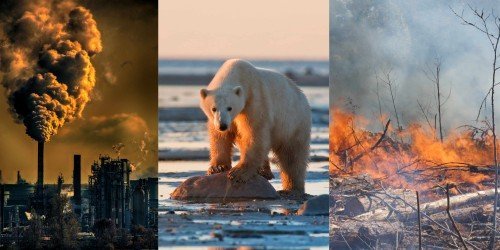
Introduction:
Global warming is one of the most pressing environmental issues facing our planet today. It is a gradual increase in the Earth's surface temperature caused by an increase in greenhouse gases, primarily carbon dioxide, in the atmosphere. The problem of global warming has gained significant attention in recent years due to its severe impacts on the environment, human health, and the economy. In this blog post, we will discuss the causes, effects, and solutions to global warming.
Causes of Global Warming:
The primary cause of global warming is the increase in greenhouse gases in the atmosphere. Greenhouse gases trap heat in the atmosphere and cause the Earth's surface temperature to rise. The main greenhouse gases are carbon dioxide, methane, and nitrous oxide. These gases are released into the atmosphere by human activities such as burning fossil fuels, deforestation, and industrial processes.
Burning fossil fuels such as coal, oil, and natural gas for energy is the primary source of carbon dioxide emissions. The transportation sector, including cars, trucks, and planes, is the largest contributor to carbon dioxide emissions. Deforestation is another significant contributor to global warming as trees absorb carbon dioxide from the atmosphere during photosynthesis. When forests are cleared, the carbon stored in the trees is released into the atmosphere.
Effects of Global Warming:
Global warming has severe impacts on the environment, human health, and the economy. One of the most significant impacts of global warming is the melting of polar ice caps, resulting in rising sea levels. As sea levels rise, coastal cities and low-lying areas become more vulnerable to flooding and erosion.
Global warming also leads to more frequent and severe weather events such as hurricanes, heatwaves, droughts, and wildfires. These events can cause significant damage to infrastructure, property, and crops, resulting in economic losses and food shortages.
The warming of the oceans also has severe consequences for marine life. Warmer oceans lead to the death of coral reefs and the loss of habitat for many marine species. The acidification of the oceans due to increased carbon dioxide levels also has severe impacts on marine life, affecting their ability to form shells and causing harm to their reproductive systems.
Energy efficiency refers to the ability to use energy in a way that reduces energy consumption without sacrificing performance. Increasing energy efficiency is crucial in reducing greenhouse gas emissions and addressing climate change. It also helps individuals and businesses save money on their energy bills. In this blog post, we will discuss ways to increase energy efficiency and reduce energy consumption.
Upgrade to Energy-Efficient Appliances:
Upgrading to energy-efficient appliances is one of the most effective ways to reduce energy consumption. Look for appliances that are ENERGY STAR certified, which means they meet strict energy efficiency guidelines set by the U.S. Environmental Protection Agency. Energy-efficient appliances such as refrigerators, air conditioners, and light bulbs use less energy and can save you money on your energy bills.
Install Programmable Thermostats:
Installing programmable thermostats can help you save energy by adjusting the temperature in your home based on your schedule. You can set the thermostat to lower the temperature when you're away from home or sleeping, and raise it when you're back. This way, you can avoid wasting energy by heating or cooling an empty home.
Seal Air Leaks:
Air leaks in your home can cause drafts, leading to energy waste. Seal air leaks around doors, windows, and other areas with caulking or weatherstripping. This will help keep warm air in during the winter and cool air in during the summer, reducing your energy consumption and saving you money on your energy bills.
Use Energy-Efficient Light Bulbs:
Switching to energy-efficient light bulbs such as LED bulbs can significantly reduce your energy consumption. LED bulbs use 75% less energy than incandescent bulbs and can last up to 25 times longer. They may cost more initially, but they will save you money in the long run.
Unplug Electronics When Not in Use:
Electronics such as TVs, computers, and chargers consume energy even when they are not in use. Unplug them when they are not in use, or use power strips that can be turned off when you're not using them.
Maintain Your HVAC System:
Regular maintenance of your heating, ventilation, and air conditioning (HVAC) system can increase its efficiency and reduce energy consumption. Change air filters regularly, clean air ducts, and have your HVAC system serviced annually to keep it in good condition.
Solutions to Global Warming:
To address the problem of global warming, we need to reduce greenhouse gas emissions and shift to cleaner sources of energy. This can be achieved through the following measures:
-
Reduce fossil fuel use: We need to reduce our reliance on fossil fuels for energy and shift to renewable energy sources such as wind, solar, and hydro power.
-
Increase energy efficiency: We can reduce greenhouse gas emissions by increasing energy efficiency in buildings, transportation, and industrial processes.
-
Promote sustainable transportation: We need to promote public transportation, walking, and cycling as alternatives to driving cars.
-
Plant more trees: Trees absorb carbon dioxide from the atmosphere during photosynthesis and help to reduce greenhouse gas emissions.
-
Reduce food waste: Food waste produces methane, a potent greenhouse gas. We can reduce food waste by improving food storage and distribution systems and promoting composting.
Conclusion:
Global warming is a severe environmental issue that requires urgent action. The primary cause of global warming is the increase in greenhouse gases in the atmosphere, primarily caused by human activities such as burning fossil fuels and deforestation. Global warming has severe impacts on the environment, human health, and the economy. To address the problem of global warming, we need to reduce greenhouse gas emissions and shift to cleaner sources of energy. We all have a role to play in addressing this issue, and we need to take action now to ensure a sustainable future for our planet.
Increasing energy efficiency is an essential step in reducing energy consumption, saving money on energy bills, and addressing climate change. Upgrading to energy-efficient appliances, installing programmable thermostats, sealing air leaks, using energy-efficient light bulbs, unplugging electronics when not in use, and maintaining your HVAC system are all effective ways to increase energy efficiency. By taking these steps, we can all contribute to a sustainable future and protect our planet.








